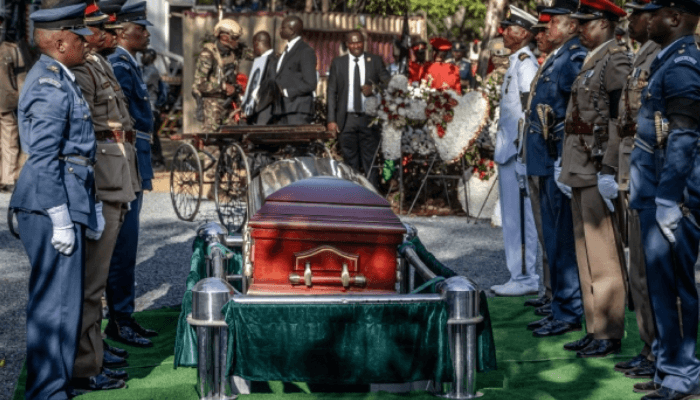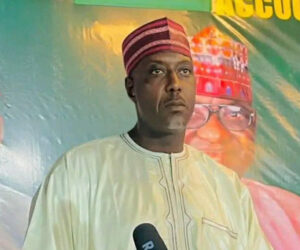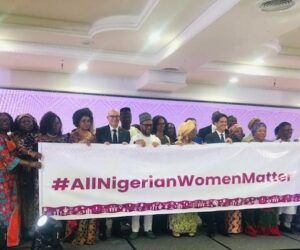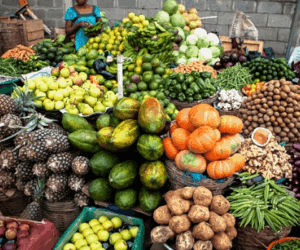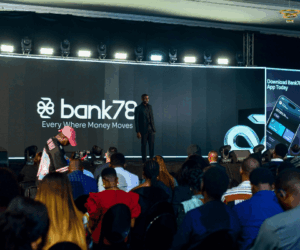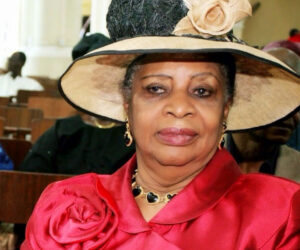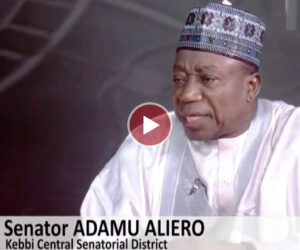Senior military officials serving as pallbearers stand before the coffin of Kenya’s opposition leader and former Prime Minister Raila Odinga as he receives military honours during his burial ceremony in Bondo, on October 19, 2025.
Raila Amolo Odinga, Kenya’s former prime minister and veteran opposition leader was laid to rest on Sunday in his ancestral home of Bondo, western Kenya, following a week of national mourning and days of emotional tributes to a man many described as the conscience of the nation.
Thousands of mourners, from political leaders and foreign dignitaries to ordinary citizens, gathered for the state funeral at Jaramogi Oginga Odinga University, named after his father, before accompanying the procession to his family homestead, where he was buried beside his late parents. His coffin, draped in the Kenyan flag, was carried by military pallbearers as trumpets sounded the Last Post and the national anthem filled the air.
Read also:Raila Odinga: The perennial challenger who shaped Kenya’s politics
“Now finally, Baba is home,” said Raila Odinga Jr., standing beside his father’s casket, his voice heavy with emotion.

For hours, the crowd of mourners — many waving Kenyan flags and portraits of the late leader — chanted “Jowi” (a local expression of strength) and “Baba,” the nickname that became his political identity. Odinga’s burial capped a week of national reflection for a figure who shaped Kenya’s democratic journey and whose influence spanned generations.
President William Ruto, who had in recent months forged a working alliance with Odinga after years of political rivalry, led the tributes. “His courage, his vision, and his unyielding faith in our collective destiny will forever illuminate the path of our nation,” Ruto said. “His return to Bondo was not merely a homecoming; it was the embrace of a grateful Republic bidding farewell to one of its greatest sons.”

Also in attendance were former Nigerian president Olusegun Obasanjo and other African dignitaries who hailed Odinga’s contribution to democracy across the continent.
Read also:Experienced Raila Odinga pushes for peaceful, prosperous Africa
Odinga, who died on Wednesday in Kochi, India, aged 80, was for decades at the heart of Kenya’s political life — admired, contested, and rarely ignored. A fierce critic of authoritarian rule, he was detained several times during the regime of Daniel arap Moi for pushing for multiparty democracy.
Though he never achieved the presidency despite five attempts, Odinga served as prime minister between 2008 and 2013 after a disputed election that nearly tore the country apart. His power-sharing deal with then-president Mwai Kibaki helped stabilise Kenya, earning him respect even from opponents.
Former US president Barack Obama, whose father hailed from the same Luo region, described Odinga as “a true champion of democracy.”
Across the lakeside city of Kisumu and the dusty roads leading to Bondo, banners bearing Odinga’s image read Baba wa Taifa — “Father of the Nation.” For many, his burial marked the end of an era.
Read also:Raila Odinga: The visionary leader Africa needs for transformative change and unity
“To us, he was not just a politician. He was our father,” said Grace Auma Lubale, a mourner from Kisumu to AFP. “He taught us to fight for our rights, and we’ll miss him, but his legacy will remain in us.”
Odinga’s burial followed several days of public commemorations — including a state funeral in Nairobi and a public viewing in Kisumu attended by tens of thousands. The gatherings drew massive crowds, at times chaotic, with reports of casualties amid surging crowds.
As the sun set over Lake Victoria, Odinga’s casket was lowered into the ground at the family mausoleum in Bondo. The air was filled with song and prayer as mourners paid their last respects to the man who had, for decades, been the face of Kenya’s democratic struggle.
“Even in the grave,” one mourner said softly, “he still remains our hero.”

